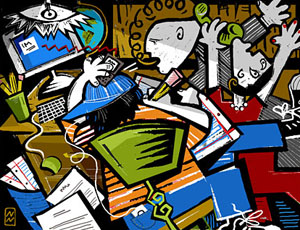 Isn’t multitasking a great subject? It must be since I keep coming back to it. Today, Matt Yglesias, who is still (barely) a twenty-something, says that he’s long since figured out that true multitasking is impossible (i.e., literally paying attention to multiple things at once), but:
Isn’t multitasking a great subject? It must be since I keep coming back to it. Today, Matt Yglesias, who is still (barely) a twenty-something, says that he’s long since figured out that true multitasking is impossible (i.e., literally paying attention to multiple things at once), but:
I’m never totally sure what it is that people mean by “multitasking.” Does switching between tasks rapidly count? I do that all the time. A little reading, write a post, respond to some emails, send some tweets, then do it all over again. That seems inherent to the life of the professional blogger. And I do think it’s scrambled my brain a bit, insofar as I find it much harder now to read long books than it was when I was in high school….I think people ought to try to distinguish between switching between tasks (useful as more kinds of tasks are invented) and actually trying to do multiple things simultaneously, which seems to me to be a fool’s errand.
Task switching is obviously a different thing than multitasking, and humans have been doing it for a long time. Anytime you get interrupted, either electronically or in person, you have to switch tasks at least briefly. And the cost of this is that you lose your train of thought and have to get it back when you return to your original task.
This is harder for some things than others. Blogging is obviously tailor made for task switching. Each blog post is a single short thought that doesn’t require a ton of concentration to keep in mind. So if the phone rings or someone IMs you, it’s not a big deal. Writing computer code, by contrast, is exactly the opposite: it usually involves keeping a complex problem in working memory for a substantial time as you put together a few dozen or hundred lines of code to address it. When I was in the computer biz, programmers complained bitterly whenever they were deeply into a tricky piece of coding and some yahoo product manager (i.e., me) would wander by their cubicle to ask them why they’d put a button in one place instead of another. Poof! Their concentration was broken and they’d have to spend several minutes regaining it after I left. I’ve done just enough coding myself to understand this state of mind perfectly, and this is no prima donna excuse making. It’s absolutely real.
Still, not everything is like that, and I’ve always thought that although the media onslaught that bathes kids from earliest childhood had obvious drawbacks (most notably a shortening of attention spans), it probably also had advantages. The main one, it seemed to me, was that kids raised this way could probably task switch faster than older people like me. And who knows? In the world of the future, maybe that will be more important than having a long attention span.
But this is what makes the recent research on multitasking so dismal: it turns out that high multitaskers can’t task switch faster than others. In fact, they’re worse at it. They’re worse at everything.
Now, who knows. Maybe experiments in the lab are incomplete. Maybe things will be different for kids who grow up this way from earliest childhood. Maybe. But I doubt it. More likely, critical brain functions are being lost, and nothing is being gained in return. It’s kind of grim.

















